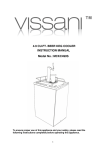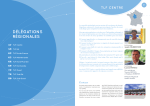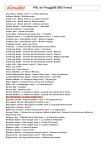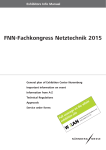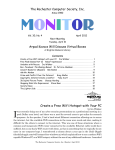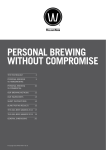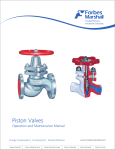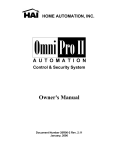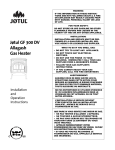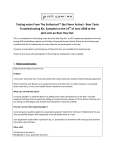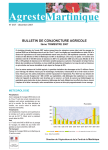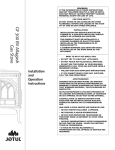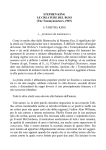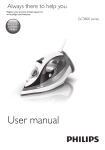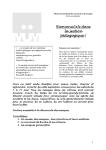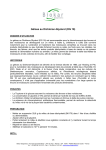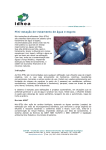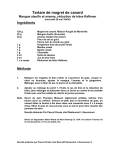Download MCKC490S Keg Cooler Customer Service Manual
Transcript
MCKC490S Keg Cooler Customer Service Manual Parts / Components.................................................................................................................. 2 Main Cooler ................................................................................................................................ 2 Castors..................................................................................................................................... 2 Interior..................................................................................................................................... 2 Thermostat .............................................................................................................................. 3 Rear ......................................................................................................................................... 3 CO2 Cylinder .............................................................................................................................. 4 Regulator (Single or Double Gauge) .......................................................................................... 5 Red Air Hose............................................................................................................................... 7 Coupler (Tapper, Tap) ................................................................................................................ 8 5’ Clear Beer Hose.................................................................................................................... 11 Beer Tower................................................................................................................................ 12 Chrome Beer Faucet ................................................................................................................. 14 Common Issues and Questions ............................................................................................. 15 My keg of (insert favorite beer) doesn’t fit............................................................................... 15 Leaking / Losing CO2............................................................................................................... 16 Unit Not Cooling Enough ......................................................................................................... 17 Too much foam ......................................................................................................................... 19 Unit not Dispensing Beer.......................................................................................................... 20 Can I Use Keg Cooler for Import Kegs? .................................................................................. 21 Beers with Kegs using American Sankey Coupler ............................................................... 22 1 Parts / Components Main Cooler This is the refrigerator part of the Keg Cooler. It is a small refrigerator with holes to allow for the hoses and beer tower. There is a thermostat dial inside the front of the unit at the top left that controls the temperature in the unit. The ‘cold’ is generated from a cold plate in the rear of the unit. Castors Elevate the unit Allow unit to be easily moved Can be locked for stability Necessary for door to work properly. Front castors use metal washers to distribute weight Rear Castors screw to metal frame of the unit Attached Front Caster w/ Washer Interior The inside of the refrigerator Where the Keg goes Has metal plate at bottom to hold kegs weight Thermostat is accessed inside Cooler w/ Keg of Bud in it Thermostat Control Hole for Red Air Hose Rear Cooling Plate Metal Plate to put keg on 2 Thermostat The thermostat, located in the front, top left corner inside the refrigerator, is used for controlling the internal temperature of the unit. Dial is numbered 1-6, and off. The higher the number, the colder the temperature Can be used to turn unit off Also called the ‘cold control’ Close up of the thermostat removed from it’s housing. *Note the adjustment screw that will change the range it cools. Rear Simply put, the back of the Keg Cooler. For the most part, once the unit is assembled and running, the back is out of site. Would mostly be accessed only to check pressure on the regulator, turn CO2 on or off, or to refill the CO2 cylinder. The back of the refrigerator Compressor is in the back CO2 Cylinder and Regulator are in the back Serial # and spec sheet located on back Has hole for Red Air Hose to pass through Close up of sticker with specs, wiring diagram, model and serial #’s. Also in view is the hole to allow the air hose to pass to interior of unit. 3 These knobs are what the CO2 cylinder bracket attach to. View of the rear of the unit with the cylinder bracket, CO2 cylinder, regulator, and air hose. CO2 Cylinder Metal air canister designed to hold compressed air Has brass valve that regulator connects to Black On/Off handle to start/stop flow of air Does NOT come full, must be filled prior to use Sits in cylinder bracket, which attaches to the rear of the unit Valve must be opened ALL the way for proper operation of the unit CO2 cylinder (left) and cylinder bracket (right) 4 Regulator (Single or Double Gauge) The regulator controls, or ‘Regulates’ the air flow coming from the CO2 cylinder. It consists of a brass fitting that attaches it via hex nut to the cylinder. This nut must be firmly seated, and tightened with a wrench. There is a rubber washer built in to the connection to prevent leaks. There are 2 types of regulator, single and double gauge. The regulator also has a secondary shut off valve, which can shut off air flow going to the keg, while still allowing air from the cylinder to the regulator. Gauges indicate air pressure in p.s.i. (lbs. per square inch) Single gauge regulator shows pressure leaving the regulator Double gauge shows air pressure leaving regulator, and air pressure in the CO2 cylinder Secondary cut off valve stops air flow from regulator to the keg Secondary cut off valve must be all the way open for proper operation Flathead screw sticking out the front used to adjust pressure to the keg Left – Single Gauge Regulator Right – Double Gauge Regulator 5 Air pressure in the CO2 cylinder (double gauge only) Air pressure to Coupler (Keg). Typically between 10-14 p.s.i. Screw used to adjust the pressure to the Keg. Attaches to Red Air Hose. Air flows from here to coupler. Attaches to CO2 cylinder. Air comes in to regulator. Below: One type of secondary cut off valve in the “OFF” or “Closed” position. In this position, no air is flowing to the coupler. The lever would be down for the “ON” or “Open” setting. Open allows air to flow to the coupler. Above: Another type of secondary cut off, again in the “Off” or “Closed” position. You can faintly see an upside down “C” and an “O” at the rounded end of the lever indicating the position. 6 Red Air Hose The red air hose is the red tube the runs between the bottom of the regulator (under the secondary cut off valve) and the coupler 5/16” Inner Diameter and 9/16” Outer Diameter Hose is 5’ long Attaches to bottom of regulator with hose clamp Runs from regulator through hole in back of cooler to the interior Attaches to coupler with hex nut Below: Barbed connector where Red Hose connects to Coupler. Hex nut holds and secures connector in place Above: Red Hose and barbed connector assembled, ready to attach to coupler via the hex nut. Notice washer, which goes into this connection. Red air hose running from regulator through hole to interior of unit. Red air hose coming in through hole and attached to coupler inside cooler. 7 Coupler (Tapper, Tap) The coupler is the part of the system that ‘taps’ the keg, and allows air in from the regulator, and beer to flow up to the tower. Our unit comes with an American Sankey, or Style ‘D’ coupler. This will work with most domestic beers (i.e.: Miller, Bud, etc). For Imports and specialty beers, other couplers are needed and can be obtained 3rd party, from companies like Banner Beer. Red Hose connects to the coupler to allow air in Coupler locks into ‘neck’ of keg Has a ‘Probe’ that actually breaks seal on keg Handle pulls out and down, locks into place to tap keg Exploded Parts Diagram Connects to Red Air Hose. Air Enters coupler. # 5 – also called pressure release valve. O-ring out of place can cause air leak # 10 – Handle Assembly pulls out, then down to actuate the probe down into the keg, then locks in place #13 – Probe that actually goes down and breaks seal to tap keg #14 & #15 – Ball and Retainer. Ball prevents backflow when keg is untapped, and retainer both holds ball in place, and acts as a washer 8 Below are actual pictures of the coupler assembly, whole and somewhat broken down Above: Assembled Coupler, ready for installation. In this image, the handle is in the down position. If you look at the very bottom of the coupler, you can see the probe in the down position. This is the part that breaks the seal on the keg, allowing air in and beer to flow out. Below: Basic breakdown of coupler. The parts that are not attached are all removable and changeable. They are all required, in the order and direction shown, for proper operation of the unit. 9 Below is a picture of the Coupler attached to a keg. You can see the Red air hose coming through the back of the unit and connecting to the coupler, and the clear beer hose attached to the top of the coupler and leading out towards the beer tower. 10 5’ Clear Beer Hose The clear hose that moves the beer from the top of the coupler, up the beer tower, to the faucet. Attaches to coupler with wing nut Has black rubber washer to prevent leaks Top attaches to beer faucet at top of beer tower Washer in wing nut. Can fall out very easily. 11 Beer Tower The beer tower is the cylinder that sits atop the keg cooler and holds the faucet. It allows enough height to put a beer mug or pitcher under the faucet. The beer tower fits into a hole in the top of the unit, a circle with 3 notches, as see to the right. The wing nut with the clear beer hose feeds down into the unit through this hole. The bottom of the tower has a round base with tabs that fit into the hole in the top of the unit, and is secured by turning the tower to lock it down. There is a plastic ring that can be placed under the beer tower for a more secure fit if needed. Below are pictures of the process of attaching beer tower to keg cooler. Feed the wing nut and clear beer tube through hole in top of unit. Line up beer tower and insert into hole 12 Beer tower will fit in with faucet off center Twist beer tower so faucet is facing front. Will lock into place. Plastic ring can be removed if too tight to twist and lock. 13 Chrome Beer Faucet The faucet is attached to the beer tower, and is used to dispense the beer. A handle screws to the threaded top of the faucet, either the standard black one that comes with the unit, or specialty faucets can be purchased by various third party sellers. The faucet comes attached to the tower out of the box, with the tap handle included in the packaging, but not attached. If loose, or if it needs to be replaced, the collar around it can be loosened and tightened using the included metal spanner wrench. Collar to loosen or tighten faucet Spanner Wrench 14 Common Issues and Questions My keg of (insert favorite beer) doesn’t fit Our keg cooler will accommodate kegs that are 16-1/8” or less in diameter, and 23-3/8” or less in height. Certain brands (such as Coors) use different shapes or sizes, not allowing the keg to fit in our unit. There are also kegs that have a rubber seal around them, which increases the diameter beyond what the keg cooler can fit. If a customer is using a keg that has the right dimensions, and the door still will not close with the keg in it, ask if they have the castors on or if it is just sitting on the floor. If the unit is set up without the castors, the door can be pushed up, not allowing the door to close fully. If the customer is using the correct keg type, and has the castors on, see if they can get the door closed by moving the door up or down a little. It may just need to be shimmed. * Hint – If a customer has already purchased a bulged Wall or Rubber Sided keg, they MAY be able to fit it by raising the keg inside the unit, so that the wider section is above the “step” in the bottom rear of the cooler. Raise widest part of keg higher than this “step”. 15 Leaking / Losing CO2 There are several places where the unit can leak CO2. Any of the connections from the cylinder to the coupler, and the coupler itself can potentially lose air. Sometimes the source of the leak will be obvious, with air hissing out. Sometimes it needs to be identified by either feeling around for the air, or spraying soapy water on the parts to look for bubbles. First thing is to find the leak. As mentioned, if it isn’t apparent, spraying soapy water around connection points and pressure release should identify where the leak is. If air is leaking from the connection between the CO2 cylinder and the regulator, make sure that the washer is in place and that the connection is tight. A wrench should be used to properly tighten this connection. Reg CO2 Tighten Here If the leak is coming from any of the connections, where a hose connects to the regulator or coupler, make sure that there is a washer in place. The keg cooler comes with all the washers already in, however they can fall out, and air will leak if they are not in place. Pull this knob If the Coupler (Tapper) is leaking, and it isn’t from where the red hose attaches, then the leak is most likely coming from the pressure release valve. Sometimes, the O-ring in the valve is out of place, and can be reseated just by pulling the valve out and releasing the valve. If this does not solve the issue, the coupler may need to be replaced. Ask what kind of beer customer is using. If it is European (ie: Heineken, Amstel, etc), then the problem is that the Couplers Probe won’t reach all the way into the Keg. If this is the case, customer needs to obtain a European Sankey Coupler (Style G, A, or U, see distributor or contact brewer for info). 16 Unit Not Cooling Enough If the unit is not cooling enough, only going down to 45º – 55º, there are a few things to look at before setting up service. Is the unit built in? There is no condenser fan motor in the MCKC490S, so it needs air flow on the compressor to properly cool. Make sure that there is plenty of space around the unit, including the sides and the back. Where is the unit located? Like many other small refrigerators, cold ambient temperatures will cause the thermostat to improperly function. Likewise, too warm of an environment will prevent proper cooling to take place. What temperature is being measured? If the thermostat is reading the air temperature in the unit, that is different than the liquid temperature in the keg. Place a cup of water in the front corner of the unit, and use a liquid thermometer to read the temp of the water. If the unit is still not cooling enough, the thermostat itself can be adjusted using the following steps. 1. Unplug the unit 2. Locate the thermostat housing in the front, top right corner of the interior of the unit. 3. Locate the 2 screws that hold the housing to the top of the interior of the cooler. The one on the right will T-stat housing be visible, easy to locate. The one seen from on the left will be out of site, below, screws accessible by inserting a Philips head on left & right. screwdriver into the hole, straight up from the bottom of the thermostat housing. Remove the screws. The housing will come loose from the top of the unit, but will hang securely by the wires and temperature sensor. 17 4. Remove the Temperature control dial by pulling straight off. Thermostat can now be removed from the housing. 5. On the side opposite the wire connections, there is a small Philips head screw, most likely with some red stuff on it. Give this screw ½ turn Counter-Clockwise. Re-assemble the thermostat and plug unit back in, then turn the thermostat to the highest setting. Wait an hour and turn unit down Turn this screw a bit, to about 4 or 5 on the temperature control dial. Wire connectors seen here on the bottom of the thermostat. 6. Let sit for a couple hours and check the temperature of the water in the cup. If unit has cooled down to proper temperature, unplug the unit, put the thermostat back in the housing, and re-attach to top of the unit. Plug unit in again, and it is all set. 7. If temperature has come down some, but not enough, repeat procedure and adjust the screw another ¼ turn, and check temp again after a couple of hours. Continue doing ¼ turns until proper temperature is reached. 8. If temperature still does not change, the thermostat should be changed. 18 Too much foam If the unit is dispensing too much foam, the problem is most likely caused by either the unit not being cold enough, or improper pressure to the keg. If the beer is too warm or the pressure to high or low, there will be excessive foam when dispensed. Check the liquid temperature in the unit. DO NOT check temperature of first glass of beer poured, as beer in the hose going up the tower will most likely be warmer than the beer in the keg. Make sure there are no CO2 leaks, and that the proper pressure is set on the regulator. It is recommended to check with the brewer or distributor for proper temperatures and pressure for each brand, as they can differ. This information can also be found online, at sites such as www.micromatic.com. The beer tower can be kept cooler by inserting foam insulation into the tower. Make sure the CO2 cylinder valve and the regulator valve are all the way open. Pull tap handle forward completely and smoothly. Keep glass tipped at an angle until about ½ full, then start to straighten glass until full. 19 Unit not Dispensing Beer Many of the answers here will fall under other categories as well. Most of the time, if the unit is not pouring beer, there was a problem with assembly and set up. First, ask what kind of beer is being used. Imported kegs will not properly tap, and no beer will come out, even if the coupler physically fits on the neck of the keg. Find out if the clear beer hose is touching the back wall of the cooler. If it is contacting the cooling plate, the beer can freezer and block the flow to the faucet. If keg is domestic, and uses the American Sankey coupler, make sure that the tap handle is down and in the locked position. If handle is still up, then keg is not tapped. Make sure that the CO2 Cylinder has been filled. It is empty when unit is purchased, and must be taken to a place that deals in CO2 compressed gas for filling. If cylinder is empty, there will be some pressure initially (from carbonation in the beer), but that will bleed off. Is the tank valve (primary shut off) fully opened? Tank valve must be turned all the way (counterclockwise) to work properly. If the valve is only partly open, there may not be proper air pressure. Is the Gauge on the regulator indicating that there is air pressure? It should be reading between 10 – 14 p.s.i., and it can be adjusted by turning the screw sticking out the front. If there is no pressure showing on the gauge, the tank may be empty or closed, or the screw needs to be turned to adjust the pressure. If tank is full and completely open, and screw adjustments don’t change pressure, regulator may be bad. 20 Is the Regulator valve (secondary cut off) open all the way? If in the Closed or Off position, or not fully open (straight down), then there is not proper air pressure coming out of the regulator. If gauge shows proper pressure, and the secondary valve is all the way in the open position, problem may be in the coupler. *Hint – Red air hose will feel harder when under pressure than when there is no air pressure. Check to see if there is pressure to the coupler by pulling Pull this knob out the pressure release valve. If there is pressure going to the valve, there will be a hiss as the release valve purges the air pressure. If no air hisses out, shut off the air at the CO2 cylinder and the regulator, and unscrew the red air hose from the coupler to inspect the ‘check valve assembly’. Make sure all the parts are in proper positions as seen in the image below. Also check that the check valve itself is facing in the right direction, with the tapered end facing into the the coupler, and make sure it has a slit in the tapered end. You can see the slit if you squeeze the sides of the tapered end, as seen in the lower right picture. If the valve does not have the slit, one can be made by just poking a hole at the end of the tapered side of the check valve. Check Valve Can I Use Keg Cooler for Import Kegs? As long as the keg is within the dimensions listed above, it should physically fit within the unit. The coupler in this unit will not fit import beers. Other styles of couplers can be purchased through www.bannerbeer.com, or can most likely be found locally at stores that deal in beer brewing or restaurant supply. 21 Beers with Kegs using American Sankey Coupler Abita Amber Abita Golden Abita Light Abita Purple Haze Abita Turbodog ACME Brown Ale ACME IPA ACME Pale Ale Alaskan Amber Alaskan ESB Alaskan Pale Ale Alaskan Smoked Porter Alaskan Stout Alaskan Winter Ale Alexander Keith Allagash Curieux Allagash Dubbel Allagash Four Allagash Grand Cru Allagash Musette Allagash Tripel Allagash Victoria Ale Allagash White Anderson Valley Belks Bitter Anderson Valley Boont Amber Anderson Valley Hop Ottin IPA Anderson Valley Poleeko Gold Avery Hog Heaven Avery IPA Avery IPA Cask Avery Karma Ale Avery Maharaja Avery Old Jubilation Avery Reverend Bad Frog - BAD Light Bad Frog Golden- Amber Lager Bad Frog Micro-Malt BayHawk Amber Ale BayHawk California Pale Ale (CPA) BayHawk Chocolate Porter BayHawk Hefeweizen BayHawk Honey Blonde BayHawk OC Lager BBC Long Beach Crude BBC Marathon BBC Strawberry Blonde BBC Top Sail Binchoise Reserve Black Dog Blanche de Chambly Blue Moon Breckenridge Brooklyn Brown Ale Brooklyn East India Pale Ale Brooklyn Lager Brooklyn Pennant Ale 55 Brooklyn Pilsner Brooklyn Post Road Pumpkin Ale Brooklyn Weisse Bruin Pale Ale Bud Dry Bud Ice Bud Ice Light Bud Light Budweiser Budweiser Select Busch Caracole Nostradamus Carlsberg Carlton and United Breweries (CUB) Castle Maine Celis Cider Jack Clipper City Heavy Seas Below Deck Clipper City Heavy Seas Loose Cannon Clipper City Heavy Seas Peg Leg Stout Clipper City Heavy Seas Red Sky at Night Clipper City Heavy Seas Small Craft Warning Clipper City Heavy Seas Winter Storm Clipper City Phillip Amber Ale Columbia Brewing Coors Coors Light Corona Custom Brewcrafters Des Rocs Grand Cru Deschutes Black Butte Devil Mountain Dogfish Head 60 Minute IPA Dogfish Head 90 Minute IPA Dogfish Head Indian Brown Ale Dos Equis Amber Dos Equis Lager Duchesse de Bourgogne Eel River Brewing Ellicottville Eurobrew Hobgoblin Draft Eurobrew Monty Python Draft Fat Tire Firehouse Firestone Double Barrel Ale Firestone Lager Firestone Pale Ale Firestone Walker's Ale Flying Dog Foret Org Sais Ale Foster's Full Sail Amber Ale Full Sail Pale Ale Genesee George Killian's Irish Red Goose Island Gordon Biersch Hefeweizen Gordon Biersch Marzen Grant's Great Divide Fresh Hop Pale Ale Great Divide Hercules Double IPA Great Divide Hiberation Ale Great Divide Oak Aged Yeti Great Divide Titan IPA Green Mountain Cidery Hamms Hard Core Cider Harpoon Ale Harpoon Brown Session Ale Harpoon IPA Harpoon Munchen Dunkel Henry Weinhard's High Falls Highland Black Mocha Stout Highland Cold Mountain Winter Ale Highland Gaelic Ale Highland Oatmeal Porter Highland Saint Terese Highland Tasgall Ale Holy Cow Red Hornsby's 22 Hudson Valley Humboldt Hemp Ale Humboldt IPA Humboldt Pale Ale Humboldt Red Nectar Ale Ice House Killarney Killian's Irish Red Kirin Ichiban Kokanee Labatt Blue Lagunitas Brown Shugga Lagunitas Cappuccino Stout Lagunitas Censored Lagunitas Hairy Eyeball Lagunitas IPA Lagunitas Maximus Leinenkugel Little Kings Lost Coast Alleycat Amber Lost Coast Apricot Wheat Lost Coast Downtown Brown Lost Coast Great White Lost Coast Raspberry Brown Mad River Jamalca Red Ale Mad River Steelhead Pale Maudite Miami Trail Brewing Michael Shea's Michelob Michelob Amber Bock Michelob Light Michelob Speciality Michelob Ultra Mickey's Middle Ages Miller Miller Genuine Draft Miller Lite Milwaukee's Best Modelo Molson Canadian Moosehead Natural Ice Natural Light New Amsterdam New Zeland Steinlager Nor'Wester North Coast Brother Thelonious North Coast Old Rasputin Stout North Coast Old Stock North Coast Pranqster Belgian North Coast Red Seal Ale North Coast Scrimshaw O'Doul's Old Dominion New River Old Dominion Oak Stout Old Milwaukee Old Vienna Oskar Blues Dale's Pale Ale Oskar Blues Duke Sour Brown Oskar Blues Gordon IPA Oskar Blues Imperial Cherry Stout Oskar Blues Imperial Stout Oskar Blues Mama's Lil Yella Pilsner Oskar Blues Money Shot Cream Ale Oskar Blues Oak Aged Gordon Oskar Blues Old Chub Pete's Seasonals Pete's Wicked Ale Porter & Summerfest Portland Mactarnahan's Amber Portland Oregon Honey Pyramid Hefeweizen Pyramid Seasonal Razors Edge Red Ale Red Dog Red Hook Blonde Red Hook ESB Red Hook IPA Red Hook Seasonal Red Wolf Rogue Dead Guy Ale Rogue Hazelnut Brown Rogue Red Rolling Rock Rouge-Mogal Saint Bernardus Abbot Saint Bernardus Prior Sais Dup Farmhouse Ale Sam Adams Boston Lager Sam Adams Seasonal Saranac Saxer Brewing Scaldis Belgian Ale Scaldis Noel Schmitt's Shiner Bock Ship Inn Shipyard Shmaltz Brewing Hebrew Messiah Bold Sierra Nevada Pale Ale Sierra Nevada Seasonal Sleemans Southpaw Spanish Peaks Black Dog Starr Hill Brewery Steinlager Strohs Tecate Thomas Creek Amber Thomas Creek Dopplebock Thomas Creek IPA Thomas Creek Multi-Grain Thomas Creek Pilsner Thomas Creek Red Ale Thomas Creek Vanilla Cream Thomas Kemper Tommyknocker Ornery Amber Trois Pistoles Tucher Unibroue Val Dieu Grand Cru Wasatch Weinhard's Whitbread Ale Widmer Hefeweizen Widmer Seasonal Woodchuck Dark & Dry Cider Wyder's Apple Cider Wyder's Peach Cider Wyder's Pear Cider Wyder's Raspberry Cider Yuengling Zebra Zuma Cancun Lager Zuma Morena Dark Lager 1
























